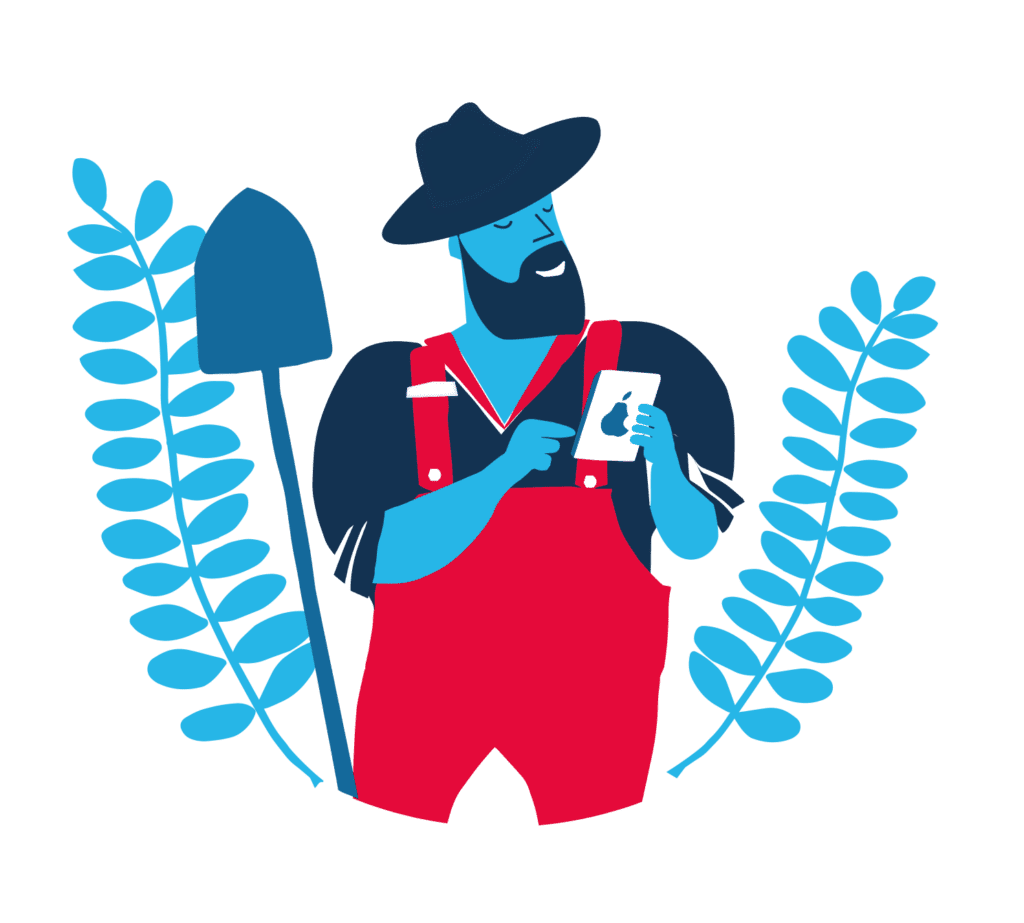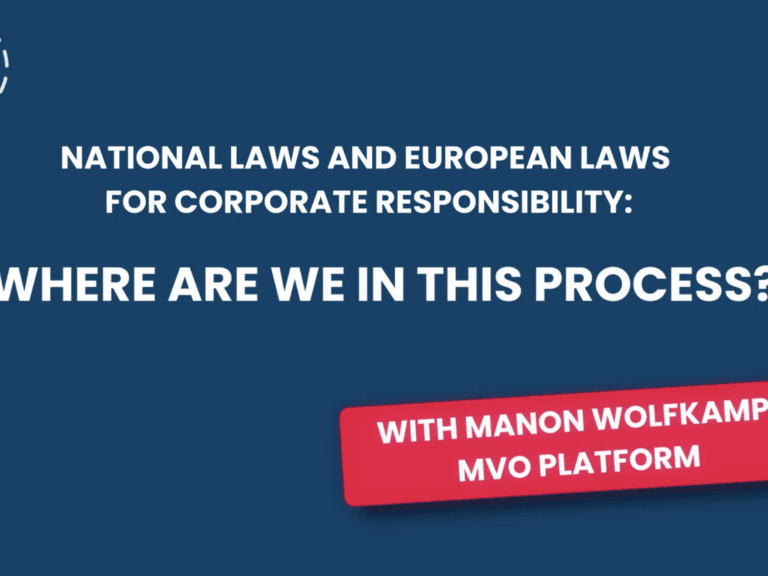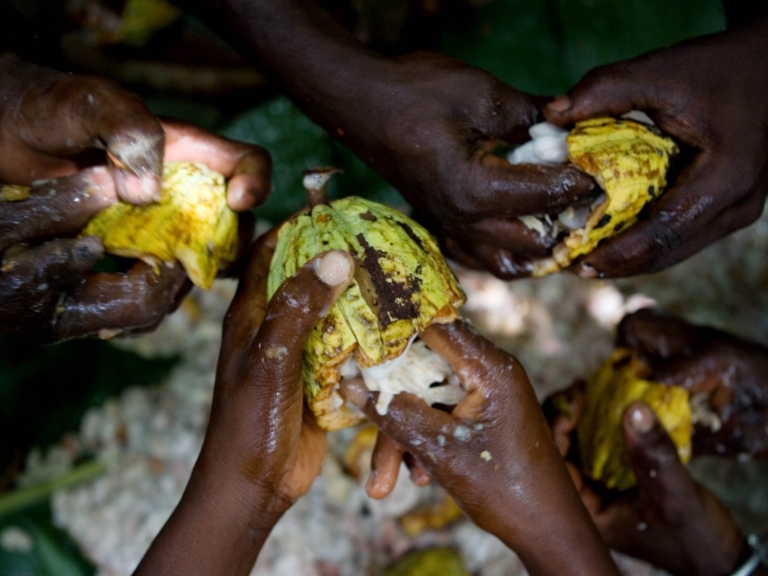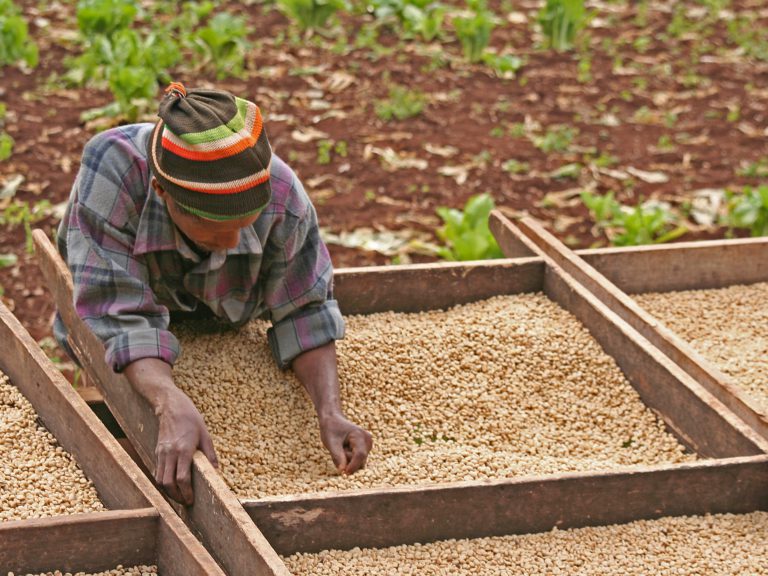Collaborating with Fairfood means gaining access to our expertise, knowledge, tools, solutions and network. This chapter brings all of that together in what we call our ‘partner journey’. For companies lagging behind, we turn to our advocacy efforts, which are covered in the final part of this chapter.
THE PARTNER JOURNEY
With corporate responsibility regulation taking shape on national and EU level, companies are preparing to open up their Pandora’s boxes. For many, transparency may still seem daunting; despite solid business operations and relationships established over the years, it is still common not to know the farmers behind a certain product. Fairfood offers support.
As we see the pace towards a more transparent food system picking up, we grew our business development team, and developed a more standardised partner journey based on our experience, solutions, tools and network. While no two sustainability journeys are the same, we’ve defined 4 overarching stages (read more here):
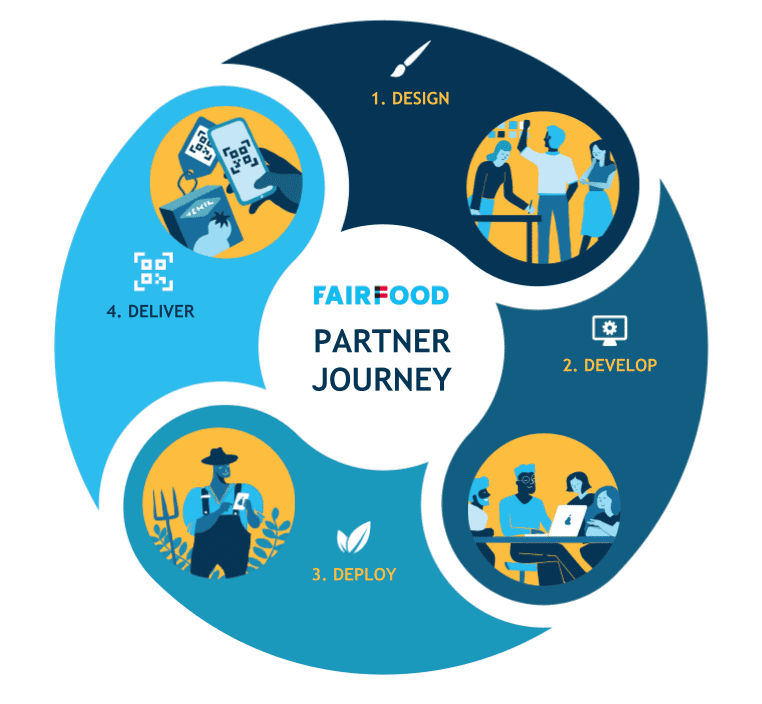
- Design: What do your supply chains look like? What data is available already? And what are the sustainability promises you would like to make and prove? In this stage, we design your journey and prepare for action
- Develop: We move on to the actual development of your journey, as we develop custom sustainability claims if needed, as well as custom reports or dashboards, and decide what data we need to collect to make your journey a success
- Deploy: This is where it gets really exciting! We map your supply chains, connect farmers to the system, gain new insights about value distribution, and back up the sustainability claims you, as a brand, want to make
- Deliver: By now, you should have quite the story to tell. This phase sees the launch of any communication efforts (think: publishing your own storytelling interface). To conclude your journey, we wrap up the project and strategise about follow-up steps
SOLUTIONS
Our solutions are a vital part of this partner journey. Central to these solutions is our farmer-centric approach to sustainability. For us, improving farmers’ livelihoods is central to making the food industry truly sustainable – ecologically and socially speaking. Moreover, excluding farmers from the innovation stream means wasted opportunities; companies struggle to get the data they need to secure supply, meet consumer needs, mitigate brand risks and pass regulations. Consumers lack relevant information and do not trust what they’re being told about their products. Our solutions are a testament to this need for farmer inclusivity to benefit all:
- First-mile digitisation for farmer inclusion (F2B)
We offer farmers easy-to-use digital solutions that connect them to the supply chain, give them a voice, and enable better access to markets and finance - Supply chain transparency for responsible sourcing (B2B)
We nurture public-private partnerships to increase supply chain transparency that enables businesses to deliver on sustainability commitments - Traceability that proves sustainability claims (B2C)
We enable supply chain mapping and product traceability, so businesses can support their sustainability claims with robust data
TOOLS
We have developed – and are continuously developing – tools that help realise all of the above. By now, you should be familiar with Trace and ALIGN. In 2022, our Farmer Cards and Field App saw the day of light.
Trace
2022 saw Trace operating at full throttle. This blockchain-enabled traceability system was created for supply chain mapping, product tracing, claim attestation and storytelling. All so that agri-food companies can tell a transparent product story to consumers, while farmers become more involved actors in the supply chain.
farmers currently have an account on Trace
companies and organisations are now using Trace
What’s especially exciting, is that in 2022 we open sourced the mobile application of Trace! This means that the code behind the platform is now public on GitHub. Other developers can build on Fairfood’s solution, making it widely available. Next step? Open sourcing the whole Trace ecosystem!
“The Fairfood team has provided us with a lot of documentation in terms of studies and use cases that allowed us to track beneficiary impact in a tangible way. Seeing, for example, the increased prices farmers get for their goods, or the data premiums that they’re receiving – that’s actual proven evidence of the impact of the work. Furthermore, what Fairfood is aiming for, is giving farmers access to their data and using that to give them a voice in their own future. This ties in very well with our goals to enable end beneficiaries to improve their own lives. Open source is also a big deal for us; an important part of Cisco’s investment strategy is for it to scale. Open sourcing and allowing other organisations to use the platform is going to be very important. We are really excited to continue the partnership.” – Sue-Lynn Hinson, Grant Portfolio Manager at Cisco
Farmer Cards and Field app
Not every farmer has a (smart)phone, let alone internet access. To abide by our principle of farmer inclusivity, we developed the Farmer Cards and a Field application. Every farmer gets their unique Farmer Card, which they bring to every transaction between them and the next actor up the supply chain. This next person – say, a collector of cocoa beans – scans the card using a newly developed mobile Field application so that the transaction is logged to the farmer’s personal blockchain wallet.
Some promising first results on the usage of Farmer Cards: We looked at a sample of 75 Indonesian nutmeg farmers who are being paid a premium for providing Verstegen with transactional data using the Farmer Cards. On average, they made an extra 94 euro on a yearly basis with this so-called Data Premium. This raises their income from nutmeg by 1.2%
ALIGN
The subject of living income and living wage seems to be everywhere these days. Does that mean we no longer need ALIGN? Well, not exactly. The subject burst out of its bubble and by now, most policymakers and companies understand why it matters. But how to realise living wages and incomes remains a challenge. ALIGN therefore guides agri-food companies through the process of implementing a living wage or income strategy. The platform offers an Action Process, a Source Map, and a Resource Library. In 2022, it gained the reinforcement of the Sustainable Food Lab, which joined as a partner, bringing the expertise behind the Living Income Community of Practice to our consortium.
“The Sustainable Food Lab has had a long relationship with ALIGN and its partners. Our formal relationship is a further commitment to collaborating, sharing best practices and resources among all stakeholders in agricultural value chains. Farmworkers’ and farmers’ ability to earn a decent standard of living is a fundamental step to ensuring equity in our agricultural supply chains. Ensuring living wages and incomes, means farmers are better able to invest in their farms and futures. Without putting farmers at the centre, we will not meet critical other goals such as climate adaption and regenerative agriculture.” – Stephanie Daniels, Programme Director at the Sustainable Food Lab
More than
unique users found their way to the ALIGN website
ALIGN is being endorsed by 8 partners. It was developed by Hivos and Fairfood, the Rainforest Alliance and the Sustainable Food Lab, with support of the German Federal Ministry for Economic Cooperation and Development, implemented by GIZ. The platform is built on the endorsement and expert contributions of the Living Income Community of Practice, the Global Living Wage Coalition and Fairtrade International
ALIGN’s Source Map now features statistics on wages, incomes and working conditions for 43 countries
ADVOCACY AND KNOWLEDGE SHARING
Despite the work that we do with frontrunner companies, we see the need to push for national and international due diligence laws. Our private sector partners are the ones that have an intrinsic motivation to improve their business conduct, but then you are left with the ones that are lagging behind. We are advocating for laws that force them to follow suit – a mere prerequisite to create a level playing field. Low payments and disregarding the environment should not be anyone’s competitive edge.
Working in over 15 countries, we bring our expertise into decision-making spaces, continuously pushing for farmer inclusion and corporate accountability. We push the agenda for more transparency and corporate accountability through knowledge sharing, presentations, round table discussions, lobby efforts, our own Living Wage & Income Lab, and through Multi Stakeholders Platforms.
Some highlights:
We gave 6 big industry presentations on the importance of transparency and traceability. For example, during the 5th Global Conference against Child Labour, hosted by the International Labour Organization and broadcasted globally, and the 2022 Platform Living Wage Financials conference, dedicated to banks and financial institutions at Dutch bank ING’s headquarters
We actively participated in several multi-stakeholder platforms, including MVO Platform (the Dutch Responsible Business Conduct Platform), the Sustainable Coffee Challenge, and the Dutch Initiative on Sustainable Cocoa (DISCO)
We published over 20 articles on transparency, traceability, living wage and income, and climate resilience
Over 2.300 people are reading our Fairfood newsletter, which on average is being opened by 35%
We kicked-off a new webinar series about data responsibility
THEMATIC FOCUS
In 2022, the focus in our outreach was on three main themes:
FAIR VALUE DISTRIBUTION
We advocate for a fairer distribution of value. For example, by bringing concrete examples of fair and sustainable business models to the stage at our Living Wage & Income Lab. A fair value chain approach made possible with transparency is at the heart of our projects. In 2022, the main examples came together in the report Transparency and traceability in service of a fair distribution of value. In this report, we explain how Fairfood’s partners have restructured their sourcing practices using transparency and traceability to improve the farmer’s position in the supply chain. We hope to inspire more companies to future-proof their businesses in the face of changing consumer demands and due diligence regulations.
FAIR DATA
Agri-food companies and development organisations are turning to digital solutions to tackle poverty and environmental issues among food producers. From tracking supply chains, driving carbon emissions and maximising yields – digital solutions in agriculture have the potential to catalyse sustainable business practices and lead rural development for smallholder communities. The collection, storage and distribution of farmers’ data is at the heart of these digital solutions, yet with little recognition of the ownership rights over their data.
In 2022, we published our farmer-centric approach to data governance in the report Who Owns Farmer Data? The Fairfood Principles on Data Governance. This document aims to inspire other tech endeavours to set off in a more responsible direction through our lessons learned from navigating the data arena – from ways for farmers to opt-in/out, give consent, get access, edit and share their data, to actually monetising it in the form of data premiums. Moreover, we launched a new webinar series to discuss this topic that, we feel, deserves more attention amid legislative calls for transparency.
Mandatory due diligence
Which brings us to the next topic. Since 2020, when the pandemic and an economic downturn hit millions of producers of food, clothing, electronics and other staples around the world, we’ve been discussing what corporate sustainability looks like in Europe. 2022 saw the publication of the first draft of the so-called Corporate Sustainability Due Diligence Directive (CSDDD). Unfortunately, far less ambitious than we expected. In light of this, we teamed up with other CSOs and companies to form a front that calls for basic workers’ rights, such as living wages and incomes, to be included, as well as greater transparency in supply chains.
We did this by actively engaging in Multi Stakeholder Platforms (more about these later), and working groups such as the one led by the VOICE Network, where we shared our expertise in a consultation paper on the added value of transparency and accountability for the cocoa sector. We also joined the chorus for a comprehensive and ambitious law through blog posts, articles, and jointly signed letters, where we listed clear measures needed to have agri-food workers benefiting from upcoming EU due diligence legislation. On this, we collaborated with names like Fairphone, Tony’s Chocolonely, Fairtrade, Solidaridad, Sustainable Apparel Coalition and many others.
Check out the best articles on mandatory due diligence:
Living Wage & Income Lab
After a pandemic that forced us to go online, the Lab was back to its original format in 2022: eye to eye, pen to paper, hands to work! A big difference is that 6 years ago, when the Lab was first launched, living wages and incomes were a niche topic. Today, this human right is finally gaining traction in the agri-food sector.
With 3 live sessions in the Social Impact Factory, the Lab discussed marketing strategies for sustainable products, efficient partnerships, and project scalability with over 60 participants. Among them were representatives of companies, governments and CSOs. Newcomers were the consultants, who arrived in droves to delve deeper into the subject recurrent in their sustainability projects.
We had participants from B Lab, Unilever, IDH, the Dutch Initiative on Sustainable Cocoa, Kumasi Drinks, Cargill and Fairphone. It was also good to see Fairfood partners taking the stage, such as Trabocca, Tradin, Rainforest Alliance and the Netherlands Enterprise Agency (RVO)
“When we work on living wages and incomes, we become obsessed with numbers. I think it’s good to remind ourselves that even though having a number is important to help us implement it, it isn’t about just that number. It’s also about the process and the partnerships that come out of it.” – Bernard Gouw, Senior Manager of Social Standards at B Lab
Multi Stakeholder Platforms
Fairfood is pushing the agenda for transparency, traceability, and living wage and income at several so-called Multi Stakeholder Platforms (MSPs). We are actively engaging with working groups and events from the Dutch MVO Platform (Corporate Social Responsibility Platform), Sustainable Coffee Challenge, IDVO (Initiative on Sustainable and Responsible Business), and the Dutch Initiative on Sustainable Cocoa (DISCO). Through these networks, our team is constantly providing knowledge and learning from member governments and businesses like Tony’s Chocolonely, Starbucks, Mondeléz, Nespresso, Nestlé Netherlands, and Friesland Campina.
Some highlights of our advocacy work in 2022:
We actively participated in the DISCO Working Groups sharing knowledge around Traceability, and Living Wage and Income
joint statements were published, one of which was a Cocoa Barometer Consortium’s consultation paper led by Voice Network
